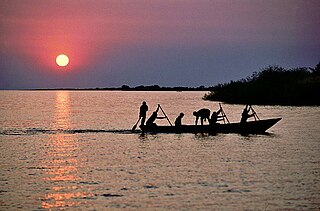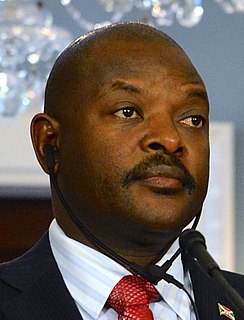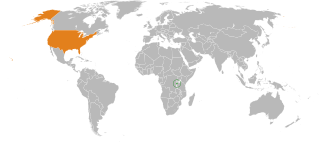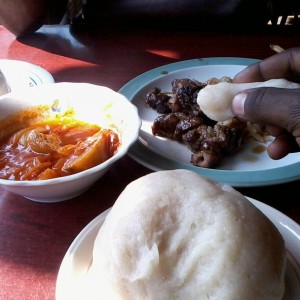
The economy of Burundi is heavily dependent on agriculture, which accounts for 32.9% of GDP in 2008. Burundi itself is a landlocked, resource-poor country with an underdeveloped manufacturing sector. Agriculture supports more than 70% of the labour force, the majority of whom are subsistence farmers. Although Burundi is potentially self-sufficient in food production, the ongoing civil unrest, overpopulation, and soil erosion have contributed to the contraction of the subsistence economy by 25% in recent years. Large numbers of internally displaced persons have been unable to produce their own food and are largely dependent on international humanitarian assistance. Burundi is a net food importer, with food accounting for 17% of imports in 1997.

Burundi is one of the few countries in Africa, along with its closely linked neighbour Rwanda among others, to be a direct territorial continuation of a pre-colonial era African state.

Bujumbura, formerly Usumbura, is the largest city and main port of Burundi. It ships most of the country's chief export, coffee, as well as cotton and tin ore. In late December 2018, Burundian president Pierre Nkurunziza announced that he would follow through on a 2007 promise to return Gitega its former political capital status, with Bujumbura remaining as economical capital and center of commerce. A vote in the Parliament of Burundi made the change official on 16 January 2019, with all branches of government expected to move in over three years.
The Hutu, also known as the Abahutu, are a Bantu ethnic or social group native to the African Great Lakes region of Africa, an area now primarily in Burundi and Rwanda. They mainly live in Rwanda, Burundi, and the eastern Democratic Republic of the Congo, where they form one of the principal ethnic groups alongside the Tutsi and the Twa.
The Tutsi, or Abatutsi, are a social class or ethnic group of the African Great Lakes region. Historically, they were often referred to as the Watutsi, Watusi, Wahuma, Wahima or the Wahinda. The Tutsi form a subgroup of the Banyarwanda and the Barundi people, who reside primarily in Rwanda and Burundi, but with significant populations also found in DR Congo, Tanzania and Uganda.

Burundi is divided into eighteen provinces, each named after their respective capital with the exception of Bujumbura Rural. The newest province, Rumonge, was created on 26 March 2015 from five communes previously belonging to the provinces of Bujumbura Rural and Bururi.

Gitega is the capital of Burundi. Located in the centre of the country, in the Burundian central plateau roughly 62 kilometres (39 mi) southeast of Bujumbura, Gitega was the seat of the Kingdom of Burundi until its abolition in 1966. In late December 2018, Burundian president Pierre Nkurunziza announced that he would follow on a 2007 promise to return Gitega its former political capital status, with Bujumbura remaining as economic capital and centre of commerce. A vote in the Parliament of Burundi made the change official on 16 January 2019, with all branches of government expected to move in over three years.

This article lists the prime ministers of Burundi since the formation of the post of Prime Minister of Burundi in 1961, to its abolition in 1998.

The Burundi national football team, nicknamed The Swallows (Kirundi: Intamba m'Urugamba), represents Burundi in international football and is controlled by the Football Federation of Burundi. The team has never qualified for the World Cup. Burundi previously did come very close to qualifying for the 1994 Africa Cup of Nations, losing only on penalties to Guinea in a playoff. However, in 2019, it qualified for the very first time, and took part in the Africa Cup of Nations finals in Group B, but lost all its matches and left from the group stage without scoring a single goal.
The franc is the currency of Burundi. It is nominally subdivided into 100 centimes, although coins have never been issued in centimes since Burundi began issuing its own currency. Only during the period when Burundi used the Belgian Congo franc were centime coins issued.

Pierre Nkurunziza is a Burundian politician who has been in power in Burundi since 2005. He was the Chairman of the National Council for the Defense of Democracy-Forces for the Defense of Democracy (CNDD-FDD), the ruling party, until he was elected as President of Burundi.

The Kingdom of Burundi or Kingdom of Urundi was a polity ruled by a traditional monarch in modern-day Republic of Burundi in the Great Lakes region of East Africa. The kingdom, majority ethnic Hutu, was ruled by a monarch from the Tutsi ethnic group with the title of mwami. Created in the 17th century, the kingdom was preserved under European colonial rule in the late 19th and early 20th century and was an independent state between 1962 and 1966.

Since Burundi's independence in 1962, there have been two events called genocides in the country. The 1972 mass killings of Hutus by the Tutsi-dominated army, and the 1993 mass killings of Tutsis by the majority-Hutu populace are both described as genocide in the final report of the International Commission of Inquiry for Burundi presented to the United Nations Security Council in 1996.

Burundi–United States relations are the international relations between Burundi and the United States.

Burundi, officially the Republic of Burundi, is a landlocked country in the Great Rift Valley where the African Great Lakes region and East Africa converge. It is bordered by Rwanda to the north, Tanzania to the east and southeast, and the Democratic Republic of the Congo to the west; Lake Tanganyika lies along its southwestern border. The capital cities are Gitega and Bujumbura.

Burundi is situated in East Africa and has a territory full of mountains, savannas and agricultural fields, with forests in the surrounding of rivers and waters. Agriculture is spread on 80% of the country's surface and it especially includes coffee, tea, corn, beans and manioc. Due to these characteristics, the Burundi cuisine is very representative of the African culinary culture, as it includes beans, which are the staple of Burundi cooking, exotic fruits plantains, sweet potatoes, cassava, peas, maize and cereals, like corn and wheat. Profiteroles are also sometimes enjoyed as a rare delicacy. Not much meat is consumed in Burundi, because animal breeding is a secondary occupation; still, there are some dishes that include goat and sheep meat but cows are very sacred.

All visitors to Burundi, unless they come from one of the visa-exempt countries mentioned below, must obtain a visa from one of the Burundian diplomatic missions before entering the country. Until 30 April 2015 citizens of all countries entering Burundi through Bujumbura International Airport were able to apply for a visa upon arrival. However, they were then required to obtain a visa in advance. In October 2015 it was announced that the visa on arrival for 3 months at Bujumbura airport would again be available to foreign visitors. An Entry Authorisation letter issued by the authorities of Burundi is now required to obtain a visa on arrival.

On 25 April 2015, the ruling political party in Burundi, the National Council for the Defense of Democracy – Forces for the Defense of Democracy (CNDD-FDD), announced that the incumbent President of Burundi, Pierre Nkurunziza, would run for a third term in the 2015 presidential election. The announcement sparked protests by those opposed to Nkurunziza seeking a third term in office.
The Military ranks of Burundi are the military insignia used by the Military of Burundi. Being a former colony of Belgium, Burundi shares a rank structure similar to that of Belgium. Burundi is a landlocked country, and does therefore not possess a navy.
The 2019–20 coronavirus pandemic was confirmed to have reached Burundi on 1 April 2020.